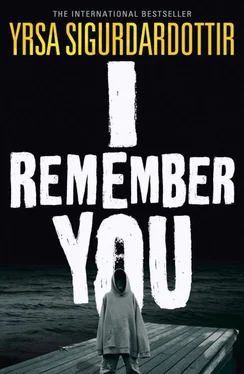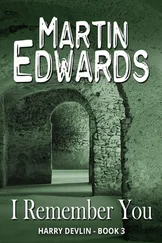‘You should also keep your phone batteries charged, and don’t hesitate to call if you have any trouble. In decent weather I can make it here in under two hours.’
‘That’s very kind of you.’ Garðar put his arm around Katrín’s shoulder. ‘We’re not quite as hopeless as we look, so I doubt it will come to that.’
‘It’s nothing to do with you. The house doesn’t have a great reputation and although I’m not superstitious, I’ll feel better knowing that you have somewhere else to go and that you’re aware you can call for help. The weather here can be dangerous sometimes, that’s all.’ When neither of them responded he wished them good luck and said goodbye. They muttered farewells in return and stood rooted to the spot, waving, as the man steered the boat carefully off the pier and sailed out into the fjord.
When they were alone, anxiety overwhelmed Katrín. ‘What did he mean by “the house doesn’t have a great reputation”?’
Garðar shook his head slowly. ‘No idea. I suspect he knows more about our plan than he was willing to admit. Didn’t he say his sister-in-law runs the guesthouse? He was just trying to scare us. I hope he doesn’t start spreading rumours about the house.’
Katrín said nothing. She was sure Garðar was wrong. Apart from Líf, no one knew about their plans. Neither she nor Garðar had discussed them with their families for fear of jinxing the project. It was bad enough that their families pitied them because of Garðar’s unemployment. Their relatives thought they were taking a trip out west for Katrín’s winter holiday from school. No, the old man hadn’t said what he did to scare them; there was something else behind it. Katrín sorely regretted not having pressed him for more details in order to prevent her imagination from running wild. The boat receded into the distance faster than she recalled it arriving, and in an incredibly short amount of time appeared only as big as her fist.
‘It’s awfully quiet here.’ Garðar broke the silence that the boat had left behind. ‘I don’t think I’ve ever been in such an isolated spot.’ He bent down and kissed Katrín’s salty cheek. ‘But the company here is good, that’s for sure.’
Katrín smiled at him and asked whether he’d forgotten their Lazarus, Líf. She turned away from the sea, not wanting to see the boat disappear completely, and looked along the beach and up towards the land. Líf was on her feet, waving at them frantically. Katrín raised her hand to wave back but dropped it when she saw something move quickly behind their white-clad friend. It was a pitch-black shadow, much darker than their dim surroundings. It disappeared as soon as it appeared, making it impossible for Katrín to distinguish what it was, but it looked a bit like a person, a short one. She gripped Garðar’s upper arm tightly. ‘What was that?’
‘What?’ Garðar peered towards where Katrín was pointing. ‘Do you mean Líf?’
‘No. Something moved behind her.’
‘Really?’ Garðar gave her a puzzled look. ‘There’s nothing there. Just a seasick woman in a ski outfit. Wasn’t it just the dog?’
Katrín tried to appear calm. It could well be that her eyes had deceived her. But it wasn’t Putti, she was certain of that; he was standing in front of Líf, sniffing the air. Maybe the wind had blown something loose. But that didn’t explain how quickly it seemed to have gone by, although there could have been a sharp gust. She let go of Garðar’s arm and focused on breathing calmly for what was left of the walk down the pier. Nor did she say anything after they’d reached Líf. There was a rustling noise and a cracking in the dry, yellowed vegetation behind them, as if someone were walking through it. Neither Garðar nor Líf seemed to notice anything, but Katrín couldn’t avoid the thought that they weren’t alone there in Hesteyri.
‘I don’t know who could have done this, but I doubt it was kids or teenagers. Although it’s certainly possible.’ Freyr stuck his hands in his pockets and stared at the destruction in front of him once more. Tattered teddy bears and rag dolls were strewn across the floor, the limbs torn from most of them and the eyes pulled out. ‘My first hunch is that we have every reason to be concerned about this person or persons, although it’s difficult to make a complete diagnosis based on this mess. If it helps, I’m leaning more towards the idea that whoever did this worked alone. I’m sorry I can’t be more precise.’ He stared at the yellow wall and the remnants of the drawings made by the Ísafjörður schoolchildren, which consisted only of the corners where they had been fastened to the wall with Blu-tack. The remainder of the drawings lay on the floor, torn and tattered; thick white paper covered with brightly coloured pictures. At first glance it appeared that the vandal had torn them down hastily in order to make room for his message. Upon closer inspection, it was clear that he’d taken time to tear the pictures up. Clumsy letters covered the wall. He had gone over each one repeatedly, scrawling them in violent strokes with crayons, which lay in pieces among the shredded drawings. There was no way of guessing the age of the person who had written the message on the wall, if it were in fact a message: DIRTY.
The wall was illuminated for a moment and Freyr was blinded by the flash. ‘Have you got anything to say about this graffiti?’ Dagný removed the bulky camera from her face without turning towards him, and instead continued to inspect the inscription.
‘No, nothing.’ Freyr studied her profile. Although it conveyed a particular kind of toughness, her short, messy hair brought out the femininity in her face – which was no doubt the opposite of what she intended. He hadn’t worked out whether it was her role as a policewoman that made her try to conceal her sex appeal, or whether it was down to her lifestyle. Dagný was unusual in this regard; generally he could read people like a book, and this uniqueness of hers attracted him, even though he received little or no response to his feeble attempts to deepen their relationship. She seemed comfortable in his presence on the rare occasions that they met, yet their friendship never seemed to have a chance to intensify. Either he was ready for it and she wasn’t, or else the few times she had shown some interest, he was immediately racked by doubt and backed off. His doubts had nothing to do with her, but with himself; deep within him dwelt the suspicion that he wasn’t worthy of her, that he was too broken and burned to make a connection with her or with any other person. But then his doubts would evaporate and she would retreat, leaving them permanently caught in this ridiculous vicious circle.
This was the first time for many years that he hadn’t known how to go about handling a relationship with someone, and it had awakened in him memories of his life before he’d become a specialist in human behaviour. These memories were probably the root of his attraction to Dagný, but he made a point of not wondering about this or drawing conclusions for fear of obliterating his feelings and ending up all alone, as he had been before. He turned away from her and focused on the word scribbled on the wall. He shook his head and blew out slowly, as he always did when he was thinking. ‘Of course, various things come to mind, though none of them are particularly helpful.’
‘For example?’ Her voice was devoid of feeling, reminding him of the bored girls who worked in his local bakery when they asked whether he wanted them to slice his bread.
‘Well, dirty money, dirty laundry, dirty politicians, dirty cops, dirty movies. Something along those lines, though I don’t see how they could possibly be connected to the vandalism.’ Dagný’s expression didn’t change. She raised the camera to her eyes again and snapped a photo. It was hard to see what that one photo would add. After taking a photo she always examined the image in the little screen to make sure she’d captured what she’d intended, so she could hardly be worried she’d messed up the ones she’d already taken. He wondered if she used the camera as a mask to hide behind.
Читать дальше










